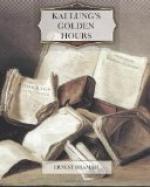“By no means,” replied Lin confidently. “But be warned by the precept: ’Do not burn down your house in order to inconvenience even your chief wife’s mother.’ Sooner or later a relation of Shen Heng’s will turn his steps towards your inner office. You can then, without undue effort, impose on him the thousand taels that you have suffered loss from those of his house. In the meantime a device must be sought for exchanging your dangerous but imposing-looking robe for one of proved efficiency.”
“It begins to assume a definite problem in this person’s mind as to whether such a burial robe exists,” declared Wang Ho stubbornly.
“Yet it cannot be denied, when a reliable system is adopted in the fabrication,” protested Lin. “For a score and five years the one to whom this person owes his being has worn such a robe.”
“To what age did your venerated father attain?” inquired the merchant, with courteous interest.
“Fourscore years and three parts of yet another score.”
“And the robe in question eventually accompanied him when he Passed Beyond?”
“Doubtless it will. He is still wearing it,” replied Lin, as one who speaks of casual occurrences.
“Is he, then, at so advanced an age, in the state of an ordinary existence?”
“Assuredly. Fortified by the virtue emanating from the garment referred to, it is his deliberate intention to continue here for yet another score of years at least.”
“But if such robes are of so dubious a nature how can reliance be placed on any one?”
“Esteemed,” replied Lin, “it is a matter that has long been suspected among the observant. Unfortunately, the Ruby Buttons of the past mistakenly formulated that the essence of continuous existence was imparted to a burial robe through the hands of a young maiden—hence so many deplorable experiences. The proper person to be so employed is undoubtedly one of ripe attainment, for only thereby can the claim to possess the vital principle be assured.”
“Was the robe which has so effectively sustained your meritorious father thus constructed?” inquired Wang Ho, inviting Lin to recline himself upon a couch by a gesture as of one who discovers for the first time that an honoured guest has been overlooked.
“It is of ancient make, and thereby in the undiscriminating eye perhaps somewhat threadbare; but to the desert-traveller all wells are sparkling,” replied Lin. “A venerable woman, inspired of certain magic wisdom, which she wove into the texture, to the exclusion of the showier qualities, designed it at the age of threescore years and three short of another score. She was engaged upon its fabrication yet another seven, and finally Passed Upwards at an attainment of three hundred and thirty-three years, three moons, and three days, thus conforming to all the principles of allowed witchcraft.”
“Cheng Lin,” said Wang Ho amiably, pouring out for the one whom he addressed a full measure of rice-spirit, “the duty that an obedient son owes even to a grasping and self-indulgent father has in the past been pressed to a too-conspicuous front, at the expense of the harmonious relation that should exist between a comfortably-positioned servant and a generous and broad-minded master. Now in the matter of these two coffin cloths—”




